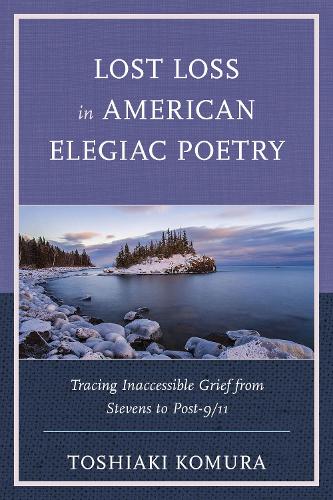
Lost Loss in American Elegiac Poetry: Tracing Inaccessible Grief from Stevens to Post-9/11
(Paperback)
Publishing Details
Lost Loss in American Elegiac Poetry: Tracing Inaccessible Grief from Stevens to Post-9/11
By (Author) Toshiaki Komura
Bloomsbury Publishing PLC
Lexington Books
12th May 2022
United States
Classifications
Professional and Scholarly
Non Fiction
811.0093548
Physical Properties
Paperback
246
Width 154mm, Height 219mm, Spine 17mm
354g
Description
Lost Loss in American Elegiac Poetry: Tracing Inaccessible Grief from Stevens to Post-9/11 examines contemporary literary expressions of losses that are lost on us, inquiring what it means to lose loss and what happens when dispossessory experiences go unacknowledged or become inaccessible. Toshiaki Komura analyzes a range of elegiac poetry that does not neatly align with conventional assumptions about the genre, including Wallace Stevenss The Owl in the Sarcophagus, Sylvia Plaths last poems, Elizabeth Bishops Geography III, Sharon Oldss The Dead and the Living, Louise Glcks Averno, and poems written after 9/11. What these poems reveal at the intersection of personal and communal mourning are the mechanism of cognitive myth-making involved in denied grief and its social and ethical implications. Engaging with an assortment of philosophical, psychoanalytic, and psychological theories, Lost Loss in American Elegiac Poetry elucidates how poetry gives shape to the vague despondency of unrecognized loss and what kind of phantomic effects these equivocal grieving experiences may create.
Reviews
In this remarkable book, Toshiaki Komura has discovered a poetic genre hiding, like Poes purloined letter, in plain sight. Lost loss is a perfect way of naming that elusive sense of loss at the equivocal core of some of the most compelling American poems, from Wallace Stevens to the poetic first responders of 9/11. We may have thought we knew what poetic elegies were all about. Komura makes us think again.
-- Christopher Benfey, Mount Holyoke CollegeAuthor Bio
Toshiaki Komura is associate professor of English at Kobe College.
